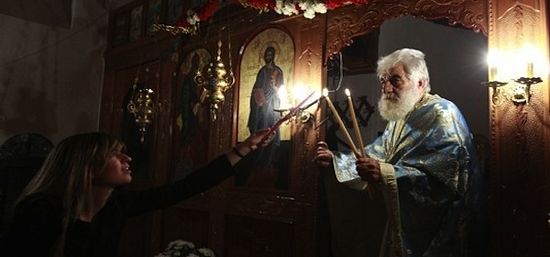 |
Individuals and political parties both from Greece and other European countries have blasted the IMF head for her inappropriate and oversimplifying and populist stance against the Greek people. Lagarde explained that her comments did not take away anything from her sympathy towards the debt suffering Greeks but noted that Greeks should all start paying their taxes and help their country exit the crisis, “especially the most privileged.”
But who are these most privileged Greeks and who are really paying their taxes in the country?
French left-wing party leader Jean-Luc Melenchon criticized Lagarde’s comments on France 3 television and said that it is the Greek Orthodox Church that had to pay its taxes. Thus, he brought once again into the spotlight the tax-free-status of the Greek Church, which has been repeatedly raised in 2011 after the emergent property taxation was introduced.
While some are turning to the Church for relief in these harsh times, others ask for the immediate taxation of the Church assets. Being the biggest real estate owner after the government, the Church of Greece has been largely exempted from taxes until 2010 even though the state, i.e. the taxpayers, pays for the priests’ salaries.
For the majority of the Greek people, the Church is a wealthy institute that could help the country in more ways than just charity. With a high clergy official holding one of the seats in the board of directors of the National Bank of Greece, after an outrageous land swapping scandal in Mount Athos that brought down the Karamanlis government and led several high ranking monks into jail, with the exact fortune of the Church being unknown and its inevitable and year-long intervention into the country’s politics, the Church of Greece was expected to make its own sacrifices and aid the country in this hour of need in a more realistic manner.
The Church on its part issued an official announcement reading that it complies with all the current taxation regulations applying in Greece, including the 20% taxation of church income from real estate holdings, the 10% taxation of cash bequests and the 5% taxation of property bequests. In its announcement, the Holy Synod attributed the general hostility against the Church of Greece to a lack of adequate knowledge concerning the status in which the Church operates towards the state. According to a priest from Alexandroupolis, the whole “immense fortune” talk is a myth. The Church has transferred during the past decades, 96% of its real estate property to the Greek state and paid 12.6 million Euros in taxes in 2011. The state in return treats the Church like any other non-profit organizations.
On a deeper level, it is common truth that politics and religion were ever hardly separable in Greece. Dating back to the Byzantine Empire, the Church gained its first power benefits through donations and property bequests by wealthy citizens and officials or those who wanted to become monks. After the Conquest of Constantinople in 1453, the Ottoman Empire granted the then archbishop of the Greek Church as an informal religious and subsequently political leader of the enslaved Greeks. For 400 years the Greek Church provided the only institutional power keeping the Greeks together and over this time the Church gathered most of its real estate property through donations and in order to save it from the Ottomans hands. The national revolution of 1821 brought the property of Turkish religious officials into the hands of the Greek Church instead of it being distributed among the people.
The Greek Church is part of the Greek state. The government cannot turn against it although disputes may emerge from time to time. There is too much at stake for both sides and the benefits enjoyed by politicians are way too precious to lose. But the ordinary, middle-class, hard-working Greek people are still paying their taxes without enjoying that much attention from the media.
The harsh tax regulations imposed by the troika did not so much touch the Greek MPs with their way too many privileges, the shipping magnates, the banks that saw their profits flourish the past decade, the many ruthless Greek tax-evaders who transferred their money to Swiss bank accounts or the corrupted politicians.
The Church needs to differentiate its position from the above-mentioned “plagues” of Greece, focus on its humanitarian mission and authentically stand by the Greek people through the harsh times. There are countless black-robed priests across Greece helping people in need, offering free meals, sheltering the homeless without any personal gain. But there are also many shadowy figures of the cleric getting too much involved with economics and politics. As announced by the Greek Archbishop Hieronymos before Easter, the Church owed to help the country even by selling its chandeliers. The Greek primate promised that the Greek Orthodox Church would proceed with its property development and further investments aiming at creating a social fund for the debt-stricken Greeks.
